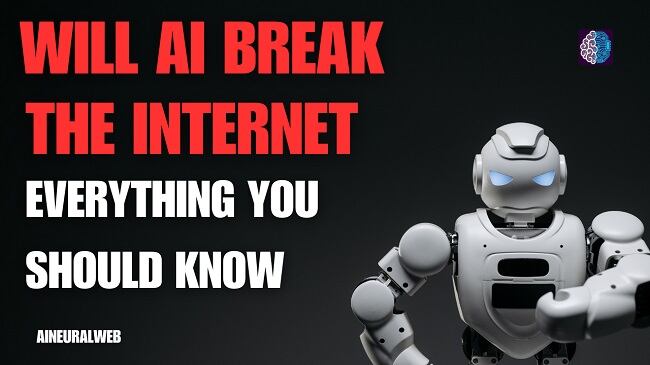Artificial intelligence (AI) continues to make significant strides, expanding its capabilities in everything from writing to image generation. This technological revolution prompts an urgent question: could AI fundamentally disrupt – or even break – the way we interact with the internet? Let’s find out the answer to the question ‘Will AI break the internet?’

Will AI break the internet?
No, AI won’t cause the internet to crash. However, it could transform how we use it by flooding the web with content, making it harder to trust information, and changing how we search.
Let’s understand it in detail:
Understanding the Concept of ‘Breaking the Internet’
In this context, “breaking” doesn’t signify a literal collapse of the internet’s infrastructure. Instead, it concerns a possible radical transformation of the online experience as we currently know it. Let’s examine the primary ways AI could drive such a transformation:
- Infrastructural Overload: The AI Content Deluge AI can generate vast quantities of content rapidly, raising concerns about strain on network bandwidth and data storage capacities. If left unaddressed, slowdowns, congestion, and potentially even outages could ensue exclamation.
- The Crisis of Trust: Discerning Facts from AI Fabrication As AI becomes increasingly skilled at mimicking human-generated content, our ability to authenticate online information is jeopardized. Projects like Devin AI, which aims to create fully functional software that can be developed by just giving simple commands to the AI. Devin AI is considered a potential threat to software engineers’ jobs. Deepfakes, AI-written articles, and social media bots threaten to severely undermine the very foundation of trust that the internet was built upon.
- The Transformation of Search: AI’s Impact on Information Gathering AI search promises convenience, yet often lacks source transparency. Over-reliance on such tools could erode critical evaluation skills, reducing our ability to assess the reliability and diversity of online information.
- AI as a Weapon: Amplifying Existing Cybersecurity Threats The same tools used for innovation can be exploited by malicious actors. AI-powered phishing, disinformation campaigns, and infrastructure attacks have the potential to reach unprecedented levels of sophistication and reach.
How Can We Safeguard the Internet?
Addressing the potential risks of AI requires proactive solutions:
- Infrastructure Investment: Significant upgrades to data storage and bandwidth will be essential to support the growth of AI-generated content.
- Verification Technologies: Developing reliable authentication methods, such as digital watermarks and AI-powered fact-checking, is paramount to combatting misinformation.
- User Empowerment and AI Literacy Fostering critical thinking and digital literacy in the face of AI search engine results will help users maintain a healthy skepticism.
- Adaptive Cybersecurity and Regulation: AI-powered cybersecurity systems and evolving regulatory frameworks will be key in addressing AI-fueled cybercrime and disinformation campaigns.
The Potential Benefits: AI as a Tool for Enhancement
While it’s important to acknowledge the risks, AI also holds the potential to enhance the internet experience:
- Breaking Accessibility Barriers: AI-driven technologies can make the internet more inclusive through text-to-speech, real-time translations, and assistive tools.
- Filtering Harmful Content: Refined AI systems could assist in effectively identifying and mitigating the spread of harmful content.
- Personalization and Innovation: AI can tailor online experiences and power new forms of creativity and entertainment.
The Imperative of Responsibility
The way we shape and regulate AI will heavily influence its trajectory and long-term impact on the internet. Cultivating AI literacy, prioritizing ethical development, and establishing robust governance frameworks are essential for ensuring the safe and beneficial integration of AI technologies.
What’s your opinion?
As stakeholders in the digital landscape, businesses, policymakers, and internet users alike must engage in critical discussions surrounding the future of AI. How do we balance innovation with safeguarding the integrity and accessibility of the internet for generations to come? Write down your opinion in the comment section below.
FAQs
How can I tell if something online was created by AI?
Unfortunately, there’s no foolproof way yet. However, watch for unnatural language patterns, inconsistencies in tone or details, and images with strange glitches or unrealistic elements. AI-powered fact-checking and verification tools are in development, which should help in the future.
Could AI be used to combat harmful content online?
Yes! AI is already being used in some moderation tools to identify hate speech, harmful content, and potential disinformation. As AI becomes more sophisticated, it has the potential to be even more effective in aiding content moderation efforts.
Will I need to pay for AI-powered search engines in the future?
It’s possible. Some AI search models might be integrated into existing search engines, while others could be offered as subscription services. It’s also likely that free versions will exist, potentially with limitations on usage or features.
What can I do to protect myself from AI-generated misinformation?
Cross-check information with multiple trusted sources, be wary of content that seems too extreme or sensational and familiarize yourself with tools that can help detect AI-generated content.
Also read:
